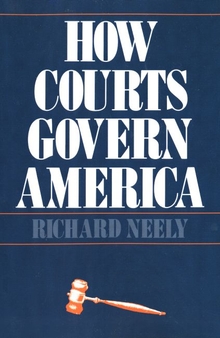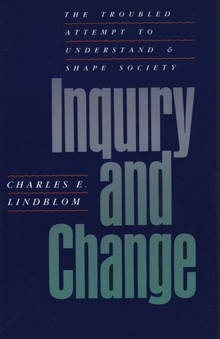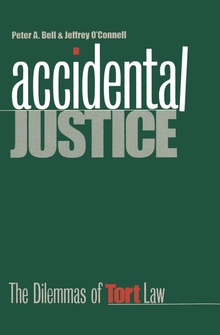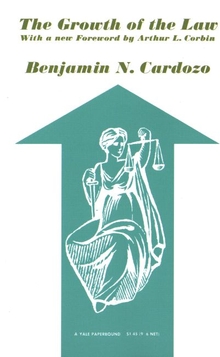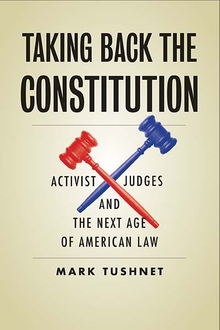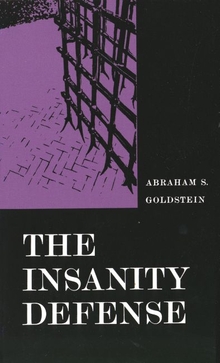How Courts Govern America
WARNING
You are viewing an older version of the Yalebooks website. Please visit out new website with more updated information and a better user experience: https://www.yalebooks.com
Richard Neely
It is a familiar complaint that the courts are everywhere and no one is untouched by court intrusions into our everyday life. Why have life-tenured judges who are beyond the reach of the democratic process taken charge of our democracy? In this book a lively young judge sweeps away the rhetoric of scholars and describes the real reasons for an activist judiciary as he sees them from his own experience in politics and his present position on the bench. Far from considering the role of the courts a threat, he offers the surprising theory that the courts are the central institution that makes American democracy work.
Neely explains the power of the courts by analyzing the structural and operational defects inherent in the other institutions of American government—the electoral system, the executive and legislative branches, the bureaucracy, and political machines. He shows how Congress deliberately leaves responsibility for important lawmaking in the hands of the courts to avoid the political consequences of alienating special interests and how bureaucrats, frequently influenced by self-serving goals, cannot be depended upon to act in the best interests of the public. Citing examples of legal corruption in every level of government outside the courts, he argues persuasively that the foundation of court power is its comparative honesty.
Although Neely is a proponent of judicial activism, he stresses the need for judicial restraint and cautions against the court’s usurpation of power in decisions that rightfully belong elsewhere. He creates a set of neutral, intellectually justifiable principles by which judges, lawyers, and laymen can assess whether a court’s intrusion into political policymaking in a given case is legitimate.
“Promises to be the most important book on constitutional law in the last fifty years.” –Stanley E. Presier, TRIAL
“Neely crisply maintains that courts are forced to make the hard policy choices legislators avoid. Drawing on his own experience as a state legislator and supreme court judge, Neely laces his argument with lively anecdotage. The author’s breezy style makes for delightful reading.” –Walter Gellhorn
“Must reading for any student of government.” –Charles Peters, Washington Monthly
“A witty defense of judicial activism by a young justice of the West Virginia Supreme Court. It is generally devoid of cant; refreshingly blunt, in fact.” –Joseph Sorban, National Review
“A minor classic on how American courts operate (not to say govern). This work by a gifted prose stylist will be neglected at peril by those seeking truth about the contemporary judiciary.” –J. Patrick Lewis, Business and Society Review
“Justice Neely’s analysis of how the system works makes this book a valuable contribution to the growing body of judicial realism literature.” –William J. Daniels, Perspective
“Bright, perceptive, and informative…. Justice Neely offers the best analysis I have seen of the realities of cooperation and tension between courts, legislature, and executive administration.” –Graham Hughes, The New York Review of Books
“One of the most informative and enjoyable works on government that I have read. The author is incisive, accurate and humorous. He explodes many myths about government and politics…. Should be required reading for every political science student.” –Richard M. Mosk, Riverside Press/Daily Enterprise.
“Promises to be the most important book on constitutional law in the last fifty years.”—Stanley E. Presier, TRIAL
“Neely crisply maintains that courts are forced to make the hard policy choices legislators avoid. Drawing on his own experience as a state legislator and supreme court judge, Neely laces his argument with lively anecdotage. The author’s breezy style makes for delightful reading.”—Walter Gellhorn
“Must reading for any student of government.”—Charles Peters, Washington Monthly
“A witty defense of judicial activism by a young justice of the West Virginia Supreme Court. It is generally devoid of cant; refreshingly blunt, in fact.”—Joseph Sorban, National Review
“A minor classic on how American courts operate (not to say govern). This work by a gifted prose stylist will be neglected at peril by those seeking truth about the contemporary judiciary.”—J. Patrick Lewis, Business and Society Review
“Justice Neely’s analysis of how the system works makes this book a valuable contribution to the growing body of judicial realism literature.”—William J. Daniels, Perspective
“Bright, perceptive, and informative…. Justice Neely offers the best analysis I have seen of the realities of cooperation and tension between courts, legislature, and executive administration.”—Graham Hughes, The New York Review of Books
Publication Date: September 10, 1983

